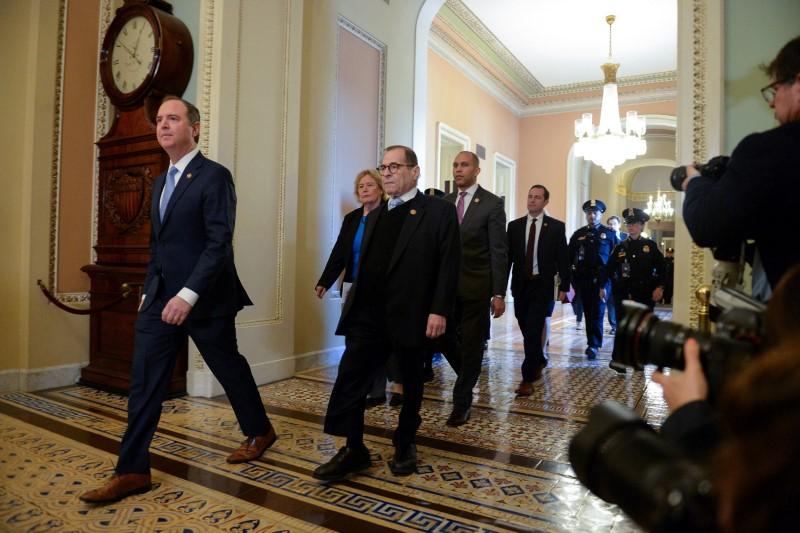WASHINGTON, (Reuters) – The Republican-controlled U.S. Senate rejected a second Democratic bid today to obtain documents and evidence in President Donald Trump’s impeachment trial, an early sign the trial could proceed along lines favourable to Trump.
As the third impeachment trial in U.S. history began in earnest, senators voted 53-47 along party lines to block a motion from Democratic leader Chuck Schumer to subpoena State Department records and documents related to Trump’s dealings with Ukraine.
The Senate earlier voted by the same margin to block a subpoena for documents and evidence from the White House on the matter.
Democrats have called on the Senate to remove Trump from office for pressuring Ukraine to investigate former Vice President Joe Biden, a political rival, and then impeding the inquiry into the matter.
Trump, who was impeached last month by the Democratic-led House of Representatives on charges of abusing power and obstructing Congress, denies any wrongdoing and describes his impeachment as a partisan hoax to derail his 2020 re-election.
During early debate, Trump’s chief legal defender attacked the case as baseless and a top Democratic lawmaker said there was “overwhelming” evidence of wrongdoing.
With the television cameras rolling, U.S. Chief Justice John Roberts convened the proceedings and the two sides began squabbling over Senate Majority Leader Mitch McConnell’s proposed rules for the trial.
White House counsel Pat Cipollone, who is leading Trump’s defense, attacked the foundation of the charges against the Republican president and said Democrats had not come close to meeting the U.S. Constitution’s standard for impeachment.
“The only conclusion will be that the president has done absolutely nothing wrong,” Cipollone said as he argued in favor of McConnell’s proposal to decide on whether to allow further witnesses or documents later in the trial.
“There is absolutely no case,” he said.
Democratic Representative Adam Schiff, who helped spearhead the House impeachment inquiry, summarized the charges against Trump and said the president had committed “constitutional misconduct justifying impeachment.”
Schiff said that although the evidence against Trump was “already overwhelming,” further witness testimony was necessary to show the full scope of the misconduct by the president and those around him.
Democrats want a number of current and former Trump administration officials, including Trump’s former national security adviser John Bolton, to testify.
“For all of the name-calling and fingerpointing from the president’s counsel, we did not hear a single argument on the merits about why there should not be the documents and witnesses we requested in this trial,” Schumer said.
Republican senators have not ruled out the possibility of further witness testimony and evidence, with likely votes later in the trial after days of opening arguments and senators’ questions.
McConnell unveiled a plan on Monday for what would be a potentially quick trial without new testimony or evidence. It would have given Democratic prosecutors and Trump’s lawyers 48 hours, evenly split, to present their arguments over four days.
That plan was changed to give each side three days to give opening arguments. The rules also will allow the House’s record of the impeachment probe admitted as evidence in the trial, as Democrats had demanded.
“We discussed it at lunch. It was pretty much a (Republican) conference consensus that made a lot more sense,” Republican Senator Ron Johnson said.
Democrats had accused McConnell of trying to rig a trial with proposed rules they said would prevent witnesses from testifying and bar evidence gathered by investigators. McConnell has repeatedly said the rules would mirror those used in the 1999 impeachment of then-President Bill Clinton, a Democrat.

